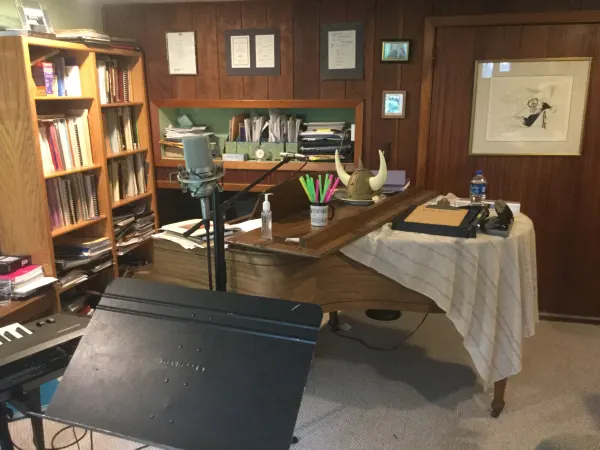Barrett Music Studio
About
I've been teaching private lessons since 1992, the year I finished my Bachelor's in Music. I have since earned both a Masters and a Doctorate in Music. I have performed across the United States and in Western Europe.
My philosophy as a teacher is to use an interdisciplinary approach to foster learning in individual students. As a teacher I help students find their strengths and use that as a starting point for growth. I teach freedom, efficiency and athleticism.
For beginners: the technical foundation and practical skills for growth.
For the experienced performer: tools to achieve the next level of mastery.
The music studio is the home base of mastery in music performance. I integrate technology and traditional techniques to foster comprehension and mastery without abandoning the traditional approach of one-on-one instruction in the studio environment. Exercises provide the backbone of sound technique. Audio and video recordings are used to provide concrete feedback to students.
My memberships in the various forums of my field - OperAmerica, NATS, MEA and ACDA - provide access to a constant stream of up-to-the-minute professional development.
More information is available at:
www.barrettvoicestudio.com
Also on Facebook:
Barrett Music Studio
I believe that music is the language of emotion, and as such, enables everyone to aspire to a higher level of humanity. I love spreading the joy of technical mastery so that music is fulfilling and inspiring for both performers and audiences.
Specialties
Years experience
Able to read music
Lesson length
Student's age
Student has instrument
Interested musical styles
Photos and videos

Reviews
lydia S.
Toni M.
Alice W.
Gail G.
Gail G.
Susan L.
Frequently asked questions
What is your typical process for working with a new student?
The first lesson is very much about getting to know the student and their current state of technique. For singers, I conduct a series of easy-to-learn vocalizes so that I can diagnose weaknesses and strengths. In many cases I ask new singers to bring what they sing best so I can hear them make music.
For instrumentalists I ask them to demonstrate their warm-up techniques, knowledge of scales, and to play a piece they know well. For raw beginners, the process is quite different as it requires an introduction to the instrument and an understanding of practice discipline.
What education and/or training do you have that relates to your work?
I hold three degrees in music, all of which I earned at the University of Minnesota: Bachelors of Music, Masters of Music, and a Doctor of Musical Arts.
I've performed across the United States, from New York City to Santa Barbara, as well as in Austria, Germany, Sweden, and Finland.
Do you have a standard pricing system for your lessons? If so, please share the details here.
$65 for a 60-minute voice lesson
$55 for a 45-minute voice lesson
$45 for a 30-minute voice lesson
How did you get started teaching?
While taking vocal pedagogy in college I learned that I enjoyed teaching, and was quite good at it! I love the transfer of knowledge and watching the transformation of students!
What types of students have you worked with?
I've worked with all types. My proudest moments have been:
1. Teaching a previously "tone deaf" retired gentleman to match pitch so that he can sing in his church choir.
2. Helping a professional musician recover their voice after having lost it to vocal damage.
3. Sending a student off on a national tour of a Tony nominated musical.
What advice would you give a student looking to hire a teacher in your area of expertise?
Find a teacher that understands the athleticism of production and performance, as well as the importance of creating a musical product that moves the listener and performer alike.
What questions should students think through before talking to teachers about their needs?
What are your goals? A teacher should be willing to help you meet your goals, as well as be able to guide you in a realistic understanding of what it will take to get you there.
Are you willing to have a rigorous look at the discipline of practice? The student needs to understand that progress doesn't happen in the absence of practice, and that no teacher can practice for them.
Are exercises really that important? Performance is the culmination of the coordination of many different factors. Exercises enable the performer to anticipate the demands of the moment.